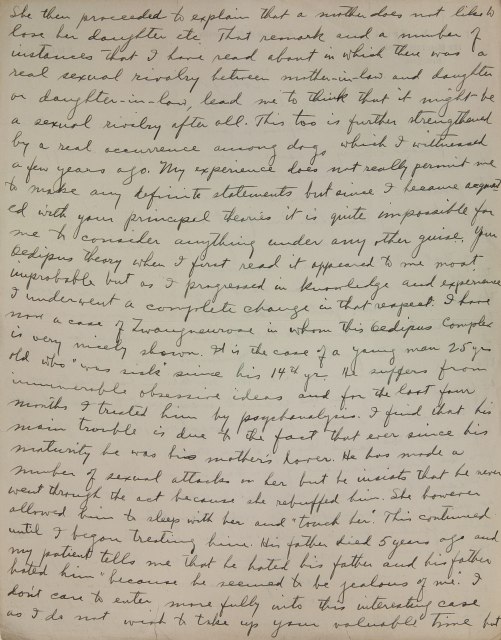-
S.
Dr. A. A. Brill
100 West 78th Street
New York
Telephone 8101 Riverside
Office hours
9 to 12, 5 to 7Nov. 18/08
My dear Professor.
First, allow me to express to you my heartiest congratulation
and please convey the same to your family. I am very pleased
to hear that you are advancing into the ranks of father‑in‑laws,
its feminine – mother‑in‑law – has lately taken up quite
a part of my thoughts. In fact I was trying to solve the
problem of mother‑in‑laws. Before proceeding I wish to
say that I do not for a moment include Mrs. Freud in
the clan mother‑in‑law as it is generally understood, on
the contrary I am quite certain that just as you have solved
the sexual problem Mrs. Freud has the mother‑in‑law problem.
I am one of the fortunate or unfortunate ones who has to taste
the real mother‑in‑law, i.e. my mother in law treats us, my
wife and myself, in the usual manner of the classical mother‑
in‑law and as I am not the exception, all my friends
experience the same thing, I am trying to find the reason
for the disagreement of mother‑in‑laws with their sons
or daughters. I had no time to work up the problem but
as far as I remember the only daughter‑in‑law showing
any affection for a mother‑in‑law was the Biblical Ruth
for Naomi. A very ingenious lady whom I happen
to know and who recently became a mother‑in‑law, wish-
ing to defend my own mother in law, remarked „Well you
can’t realize how jealous a mother feels of her daughter.“ -
S.
She then proceeded to explain that a mother does not like to
lose her daughter etc. That remark and a number of
instances that I have read about in which there was a
real sexual rivalry between mother‑in‑law and daughter
or daughter‑in‑law, lead me to think that it might be
a sexual rivalry after all. This too is further strengthened
by a real occurrence among dogs which I witnessed
a few years ago. My experience does not really permit me
to make any definite statements but since I became acquaint-
ed with your principal theories it is quite impossible for
me to consider anything under any other guise. Your
Oedipus theory when I first read it appeared to me most
improbable but as I progressed in knowledge and experience
I underwent a complete change in that respect. I have
now a case of Zwangsneurose in whom this Oedipus Complex
is very nicely shown. It is the case of a young man 25 yrs
old who „was sick“ since his 14th yr. He suffers from
innumerable obsessive ideas and for the last four
months I treated him by psychoanalysis. I find that his
main trouble is due to the fact that ever since his
maturity he was his mother’s lover. He has made a
number of sexual attacks on her but he insists that he never
went through the act because she rebuffed him. She however
allowed to sleep with her and „touch her“. This continued
until I began treating him. His father died 5 years ago and
my patient tells me that he hated his father and his father
hated him „because he seemed to be jealous of me“. I
don’t care to enter more fully into this interesting case
as I do not wish to take up your valuable time but -
S.
I merely mention it as the first case which in my experience
showed me that which I considered most rare. I am
now fixing up my translation of your work from the
Studien & Samigen and now and then I came across a term
which I find very difficult to translate. I can not get an
appropriate English word or expression for ‚Abreagieren‘ and
its noun. I thought of using „reacting off“ or „off reaction“
but it sounds rather clumsy I am now thinking of using the
term „ventilation“ from the expression ‚to give vent to ones
feelings‘ but I am not at all pleased with it. Could you
perhaps suggest any term? I also find some doubts in the
translation of the sentence pp 11 in The Sexuellen Abirrungen (Drei
Abhandlungen zur Sexualtheorie) which reads: ‚Aber viele sind
abnorm im Sexualleben etc.‘ I translated it as follows:
„But many are abnormal in their sexual life who in every other
respect correspond to the average, they have passed through the
human cultural development which weak point is the sexuality“
I can't quite understand the last part of the sentence, does it mean
that they are normal in the whole cultural development but that their
sexual life is abnormal or does the last phrase deren schwacher
Punkt die Sexualität bleibt refer to menschliche Kulturentwicklung.I am quite pleased about the last information that I have
given you concerning the Parker affair. I was quite
sure that there might be some difficulties when he told
me that we must be very careful about the sexual. I saw
him yesterday and had some talk with him. He says
that personally he has absolutely no objection to any
of our ideas but as his journal is subscribed to by a -
S.
great number of women and clergymen he will be unable to
print anything which would be objected to by his clientele.
He also says that his journal is used for a number of reading
circles and that it would be embarrassing to bring in ideas
phrases or terms which the ladies would become inquisitive
to understand and might ask the gentleman reader, in most
cases a clergyman, to explain it. He, for instance, would object
to such terms as „homosexual“ for fear it would shock the ladies.
He took that term as an example because he read the analysis
of my case which I sent to you, in which I used that expression.
But he is most anxious to have articles from you and he by all
means wants you to send the article you promised as he believes
that „by tact and literary skill“ of the translator and himself the
difficulties could be obviated and the article presented. I told him
plainly what you told me in the letter but he begged me to explain
his position to you. Personally I believe that it would be a
very good thing for our cause if a few articles explaining your
ideas could be published. His journal has aroused a great deal
of acrimonious discussions among some of our prominent neurolog-
ist which is even taken up by the daily press. But a number of
very good men are writing or have promised to write for the journal.
I would like to have your article published because I want to
see Du Bois eclipsed. Some of our men who never had the opportunity
to read your works but who read a translation of Du Bois imagine
that there is no better literature on psychotherapy. Parker also asked
me to write an article, warning me of course about the sexual, and I
am thinking of writing about psychopathology of Everyday life. I
have a very fine collection of analyses covering every heading and
I believe I could give them some idea about individual psychol-
ogy. Parker also claims that he has answered your letter. In his daily
announcements he uses your name „Some of our contributors are such
men as Du Bois, Freud etc. I have not given him your photograph
because I don’t know how things will turn out. I believe however that
it would be well if the article were published. Both my wife and myself
are very thankful to you for your kind remembrances and beg you to please convey
our good wishes to your family. Very sincerely Brill
100 West 78th Street
10023 NY
Vereinigte Staaten
Berggasse 19
Wien 1090
Österreich
C19F7




